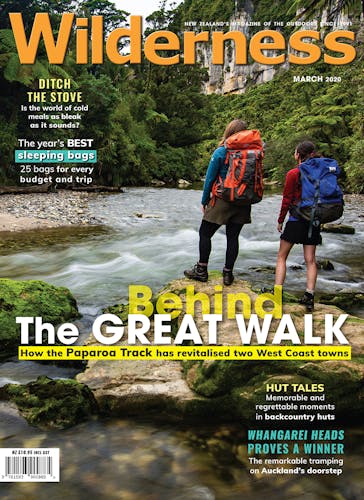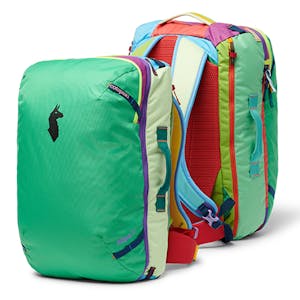The Paparoa Great Walk has been beset by storms and slips, however, at the official track opening, Kathy Ombler discovered how the challenging project has also pulled a community together
Even before it opened, the Paparoa Track had star billing as New Zealand’s only purpose-built, dual-use Great Walk: for walking and mountain biking. It’s set in a special landscape; traversing a mountain range of outstanding karst geology, river canyons and dense rainforests, much of it never before penetrated by track.
The 55km trail crosses Paparoa National Park from Blackball to Punakaiki. It was officially opened on November 30 last year and is due to fully open in March following realignment due to a major slip on the middle section. Until then, access is only permitted in and out to Pororari or Moonlight Tops Hut. The adjoining 10km Pike 29 Memorial Track will open following completion of the Pike River Mine re-entry project.
The new Great Walk was conceived to boost New Zealand’s tourism infrastructure, help the West Coast economy, and remember the 29 men lost in the Pike River Mine disaster. In reality, the Paparoa Track has become a bigger story, a story of West Coast pride, grit, and hope for the future, as those at the opening ceremony in Blackball learned.
They heard how the project brought Coasters together, creating new bedfellows among iwi, Pike River families, construction teams, DOC staff and local communities. They heard about ground-breaking environmental design, professionalism and the resilience shown by construction teams in the face of unprecedented storms. And they heard about the ‘care packages’; the cream donuts, barbecue food and ‘a few bevvies’, sent to the track crews from the Pike River families.
Speaking for the Pike River families, Colin Smith said everyone involved had been inspired to give in a very special way. “Ngāti Waewae opened a window to us in terms of our spiritual journey. The construction teams have been an inspiration. Who would have thought – two cyclones and months with half a metre of rain a week – the guys have done an amazing job.
“For us as Pike River families, it’s been a privilege to be part of this exciting journey. We now have a lasting legacy. It’s a legacy of loss; it’s also an experience for the future.”

Pike River family spokesman, Bernie Monk, said the opening was history in the making. “This track has brought us all together; the families, Māoridom and the locals, now it is going to generate revenue into the community that we love and that has supported us all so much.”
Indeed, a key aim of the new Great Walk to create business opportunities for the locals is being realised.
At Punakaiki Beach Camp, establishing a daily shuttle service and a one-stop online booking platform for Paparoa Track users was a no-brainer for manager Jed Findlay. “We are a family business and as a family we have done six Great Walks. On the other tracks, it was always hard to book – we had to contact so many different services, accommodation and transport for example.
“So here, people can book a shuttle, safe car parks and pre- and post-track accommodation. They get instant confirmation, enter one credit card number and it’s done. There’s been a fantastic response,” he says.
Daily shuttles leave Punakaiki at 8am and there’s a coffee cart at the camp. Everyone needs coffee in the morning, says Findlay. Guests are referred to local Punakaiki eateries for dining.
“Tourism gets busier here every year and yes, the track will bring more people but we have systems in place to manage that. We have also built eight new cabins for track walkers and bikers.
We think the weekend market will grow with New Zealanders biking the track which is good, because New Zealanders are the return visitors.”

Returning on the first weekend of May could be an idea. That’s when the annual Tāiko Festival, a three-day music and conservation event, is being held to celebrate the return of tāiko, the Westland petrel, to their Punakaiki breeding home.
Blackball sits on the inland end of the Great Walk and the town’s 300 residents are but a shadow of the population that was based here in the mining and milling days. But the extraction industries are gone and new business beckons.
After owning the ‘Formerly the Blackball Hilton’, and establishing Blackball Salami, Jane and Pat Wells ‘retired’ to Motueka. Jane returned for a visit and the excitement of the new Great Walk was too much for her. “I just wanted to be a part of it all,” she says. So she and Pat resurrected another old pub, now trading as the Blackball’s Inn and 08 Café, full of cosy character and ambience. A former butcher, Pat now shows flair as a barman and barista, showcasing local brews such as Kawatiri ‘Paparoa Thunder’ Coffee and Reefton Distillery gin.

Across the road, the historic Formerly the Blackball Hilton is also putting its hand up for track business. Both hotels have powered campervan sites as well as guest rooms and food. Other accommodation units are popping up in town, including the three, modern ‘Tiny Houses’ set up by Phil and Debbie Russ who took over Blackball Salami from Pat Wells, 10 years ago.
There’s so much more vibrancy in the town now, says Russ. “We get a lot of tourists but this summer, even with the Great Walk not fully open, we are getting a lot of people walking and riding on the Paparoa Track,” she says. “The business is going to come. Blackball Salami is thriving, we’re looking at developing new ‘mini’ products for trampers and bikers.” For tired track legs there’s even a local massage therapist.
Playwright Paul Maunder moved to Blackball when he spotted a house for sale for $10,000. He looks after the small but fascinating Blackball Museum of Working Class History, and has established the Te Puawai Co-op, doing ‘interesting things’ he says, to help the community, such as a Readers and Writer’s Festival, Writer’s Retreat and, now, a Paparoa Track shuttle and car relocation service.
“The notion of a co-op brings all the values of mining, solidarity and community rather than conventional small business.” It seems appropriate for Blackball, effectively the birthplace of the New Zealand Labour Party.
Maunder says the Co-op’s track shuttle service is a partnership with Geoff Gabites, who set up Paparoa Shuttles. “Geoff wanted to support the locals and we wanted to spread income through the community. It’s a nice idea. A driving shift that picks up even a few dollars can make life a lot better. We have hired four to five local drivers, all on a living wage, and the museum is the shuttle stop so it’s neutral ground from the accommodation. The Co-op is also establishing a small retail outlet at the museum for track users.”
Paparoa Shuttles is part of parent company Cycle Journeys, which also runs services for the West Coast Wilderness Trail and is building a new Greymouth base, says Gabites. “This year we have put three extra vehicles, two vans (one based at Blackball) and one bus plus three bike trailers on the coast, and we have grown from two staff to 10.
“Tai Poutini Polytech staff, students and associates have been an exciting group we have been able to tap into to offer employment,” he adds.
But don’t go looking for any swanky tourist hub in Blackball. An editorial in The Tailings, the town’s quarterly news bulletin, has this to say about the track: ‘Opportunities await those who’d like to get involved. (But) it’s important we hang on to who we are rather than kowtowing and becoming a fickle tourist town. That would lead to our eventual resentment of visitors.’
Hear hear.
The track
In early 2018, two cyclones and a huge rainstorm wreaked havoc in the Pororari Valley, smashing new bridges and tossing aside track-building machinery. Westreef worker, Barry Gordon wrote a poem to describe ‘the rainfall of no name’, that was published in Kathy Ombler’s May 2019 story ‘Pride on the Paparoa Track’.
When Kathy asked Barry for a ‘wrap’ comment on completion of the track, he responded by penning a longer poem – The Track – which was read at the opening ceremony by Conservation Minister, Eugenie Sage.
The Track
The noise of saw and diggers, the bang of a blast, keeps progress
so, to remember, men from our past.
Through river valleys and gorges so narrow, over mud and stone,
root and stump, rivers, creeks and waters that fall, up ridges
and over the passes, the track does roam,
with many a thought of 29, who never came home.The show of mothers’ tantrums, with tree, snapped, broken and
uprooted, snow in flurries, settles, then melts.
Rain so wet, never lets ‘till rivers high and loud, hanging gardens
of roots and ferns and air shows a fallen master once stood hereTrees of size and significance, alive and dead, tall and towering,
with heads that spread, Beech of red and silver, Nothofagus
is their genus, Podocarpus a plenty and Rata in its splendour,
and it seems Dr Seuss has been here with his Truffula trees,
Dracophyllum is the Latin name for theseWith hurricanes Fehi and Gita trying to do their best, ‘twas
the rainfall of no name that made the most mess
So, wrapped in mother’s blanket with uplifting views to the
West, men who are Pike 29, have their final place of rest.








